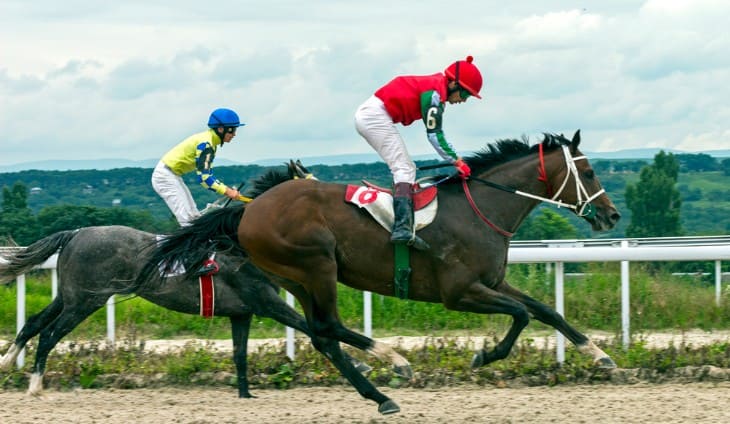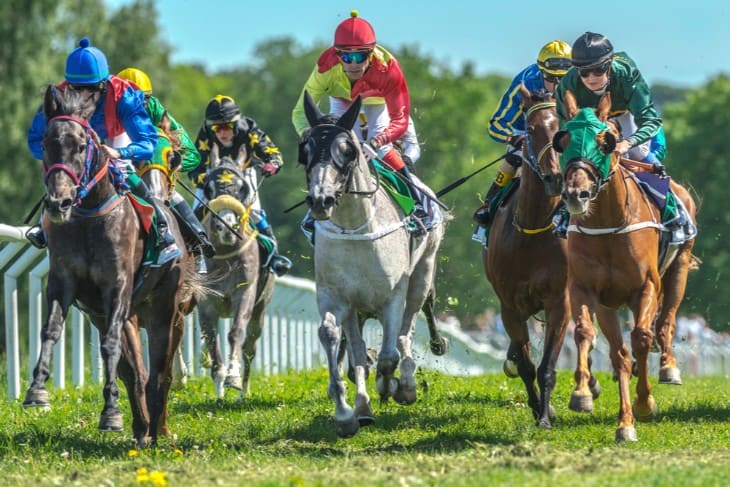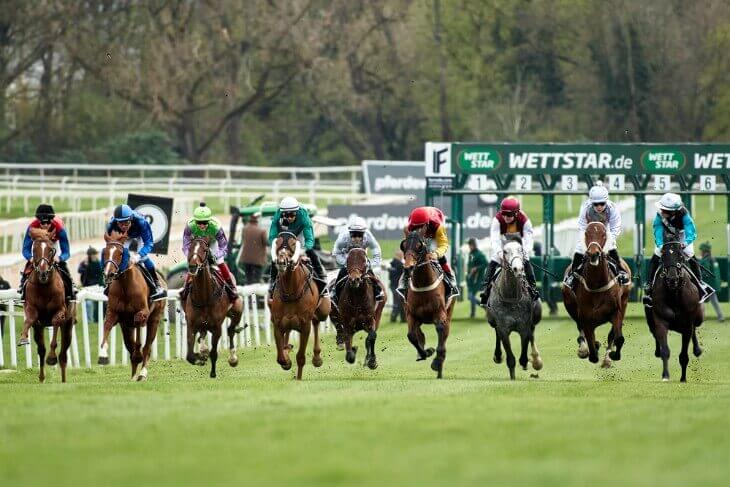Welcome to the captivating realm of amateur horse racing in the United Kingdom, where the thrill of thundering hooves and the exhilaration of victory come alive in local communities. Amateur horse racing, often referred to as point-to-point racing, is a distinguished aspect of the British equestrian landscape. This delightful sport offers an enchanting blend of competitive spirit, horsemanship, and camaraderie among enthusiasts, setting it apart from its professional counterpart.
The Thrilling World of Amateur Horse Racing
Imagine the crisp morning air as it echoes with the rhythmic galloping of horses and the enthusiastic cheers of spectators. This is the world of amateur horse racing, an enthralling spectacle that takes place in idyllic countryside settings across the UK. Unlike traditional professional racing, which predominantly occurs at esteemed racecourses, amateur racing embraces a more grassroots approach.
The allure of amateur horse racing lies in its accessibility and community-oriented nature. Point-to-point events are often organized by local hunt committees, charities, or sporting clubs, and the races are held on privately-owned fields, offering a more intimate experience for both participants and spectators. It is not uncommon for these events to double as social gatherings, where friends and families come together to enjoy a day filled with excitement and equestrian prowess.
Understanding the Distinctions: Amateur vs. Professional Racing
While both amateur and professional horse racing share a common love for equine athleticism, there are notable differences between the two disciplines. Professional racing is a highly regulated and commercialized industry, involving top-tier jockeys, trainers, and a considerable financial investment. The races are meticulously organized, with large crowds, television coverage, and significant prize money at stake.
In contrast, amateur horse racing thrives on a more traditional and grassroots foundation. It caters to local equestrian enthusiasts, often comprising amateur jockeys and trainers who have a deep passion for the sport. The races are relatively shorter in distance compared to professional contests, and while prize money exists, it is not as substantial. Instead, the rewards come in the form of cherished memories, recognition within the equestrian community, and the sheer joy of participating in a centuries-old British sporting tradition.
The Heritage and Evolution of Amateur Horse Racing in the UK
Amateur horse racing in the UK has a rich heritage that dates back several centuries. Historically, these races served as a means of testing the endurance, agility, and speed of horses, often ridden by farmers, soldiers, and local sportsmen. As equestrian skills were vital for everyday life, amateur racing provided an opportunity for riders to showcase their horsemanship and compete in friendly contests.
Over time, the sport grew in popularity and became more organized. Formal rules were established, and point-to-point racing began to take shape. The term "point-to-point" originated from the early practice of riders racing between two designated points, such as churches or landmarks, across fields and countryside. These events were often linked to hunting activities, and the races provided an opportunity to showcase the quality of hunting horses and hounds.
In the 19th and 20th centuries, amateur horse racing gained further recognition, and a structured calendar of events was established. The sport's appeal extended beyond the equestrian community, attracting enthusiastic spectators from nearby towns and villages. As the years passed, point-to-point racing became a cherished tradition, firmly embedded in the cultural fabric of the UK.

Getting in the Saddle: How to Become an Amateur Horse Racing Enthusiast
Are you intrigued by the allure of amateur horse racing and eager to immerse yourself in this thrilling world? Becoming an amateur horse racing enthusiast is a rewarding journey that starts with a genuine passion for horses and equestrian sports.
Spectate and Learn
Begin by attending local point-to-point events as a spectator. Observe the races, talk to seasoned enthusiasts, and learn about the sport's intricacies.
Get Involved with Riding
If you are not already an experienced rider, consider taking riding lessons to build your equestrian skills and confidence. Many amateur riders start their journey as leisure riders or in other equestrian disciplines.
Connect with the Community
Join equestrian clubs, follow online forums, and engage with other enthusiasts. The amateur horse racing community is welcoming and eager to share their knowledge.
Volunteer and Assist
Local point-to-point events often rely on volunteers for their successful organization. Offering your help can give you valuable insights into the behind-the-scenes workings of races.
Support Local Charities
Many point-to-point races are associated with charitable causes. By attending these events, you not only indulge in your passion but also contribute to meaningful initiatives.
Participate in Fun Rides
Fun rides are leisurely cross-country rides that are open to the public. These events provide an excellent opportunity to experience riding across varied terrains and socialize with fellow riders.
The Key Players: Jockeys, Trainers, and Owners in the Amateur Racing Circuit
At the heart of amateur horse racing are the dedicated individuals who form its backbone: the jockeys, trainers, and owners. Amateur jockeys are passionate horse riders who participate in races purely for the love of the sport. Many of them have full-time careers outside of racing and view riding as a thrilling hobby rather than a profession. Their commitment and expertise are commendable, as they compete against their peers, showcasing their riding skills and determination.
Trainers in the amateur racing circuit play a crucial role in preparing both horses and jockeys for race day. They work diligently to develop the horses' fitness, ensuring they are in optimal condition for the rigorous demands of the course. Additionally, trainers often act as mentors to amateur jockeys, offering guidance on race strategy, riding techniques, and safety measures.
Owners are the individuals who invest in and own the horses participating in races. For many owners, their involvement in amateur horse racing stems from a deep love for horses and a desire to be a part of the equestrian community. While the financial rewards may not be as significant as in professional racing, the joy of witnessing their horses compete and succeed on the track is immensely gratifying.
Together, these key players form a close-knit community, united by their passion for horses and the thrill of competition. Unlike the fiercely competitive atmosphere of professional racing, amateur horse racing fosters a sense of camaraderie and sportsmanship among its participants.
The Role of Local Racecourses in Fostering Amateur Racing Events
Local racecourses hold a special place in the hearts of amateur horse racing enthusiasts. These picturesque venues, often set in the scenic countryside, provide the perfect backdrop for a day filled with excitement and equestrian prowess. Unlike grandiose professional racecourses, local tracks offer a more intimate and relaxed atmosphere, creating a unique experience for both participants and spectators.
The organization of amateur racing events relies heavily on the dedication of local hunt committees, charities, and sporting clubs. These groups collaborate to ensure that the races run smoothly and safely. Volunteers and local businesses also play vital roles in supporting these events, whether by assisting with race logistics or providing sponsorship.
The seasonal calendar of amateur racing is typically packed with various events, each bringing its own charm and local flair. Families, friends, and equestrian enthusiasts gather at these racecourses to enjoy the spectacle, cheer on their favorite horses and jockeys, and socialize with like-minded individuals.
Beyond the thrill of the races, these events often feature attractions such as food stalls, entertainment, and charity fundraisers, creating a wholesome day out for all attendees. The close connection between the races and local communities is a testament to the enduring popularity and cultural significance of amateur horse racing in the UK.
Navigating Rules and Regulations: The Governance of Amateur Horse Racing
Amateur horse racing, like any sport, operates within a framework of rules and regulations to ensure fair play, safety, and the welfare of the horses. The governance of amateur racing in the UK is overseen by organizations such as the Point-to-Point Authority (PPA) and the British Horseracing Authority (BHA). These bodies collaborate to create and enforce rules that govern various aspects of the sport.
The PPA plays a central role in regulating point-to-point racing, overseeing fixture planning, licensing of participants, and maintaining racecourse standards. Their primary focus is on preserving the integrity of amateur racing, promoting high standards of horse welfare, and safeguarding the interests of jockeys, trainers, owners, and spectators.
The BHA, on the other hand, is responsible for the broader horseracing industry, both amateur and professional. It ensures that the sport adheres to national standards, handles racecourse safety measures, and implements anti-doping policies. The BHA also liaises with various stakeholders to support the growth and sustainability of the racing ecosystem.
Amateur jockeys must meet specific eligibility criteria and obtain a Category B Amateur Rider's License, demonstrating their competence and understanding of racing rules. Additionally, all horses participating in amateur races must be registered with the PPA and undergo veterinary inspections to ensure their fitness for competition.
By adhering to these regulations, amateur horse racing maintains its integrity and fosters a safe and enjoyable environment for all involved.
The Social and Community Impact of Amateur Racing in the UK

Beyond the thrill of the races and the love for horses, amateur horse racing plays a vital role in enriching local communities and forging social connections. These events bring together people from various walks of life, creating a sense of togetherness and camaraderie.
Local racecourses, which host amateur racing events, often become focal points for social gatherings. Families and friends gather to enjoy a day out in the picturesque countryside, making cherished memories while savoring the excitement of the races. For many, attending these events has become an annual tradition, passed down through generations.
Moreover, amateur horse racing events often align with charitable causes, supporting local charities and community initiatives. The races become platforms for raising funds and creating awareness about important social issues. The integration of charitable activities further strengthens the bond between the sport and the communities it serves.
Amateur racing also offers an entry point for individuals aspiring to pursue equestrian careers. Many professional jockeys and trainers began their journey in the amateur circuit, honing their skills and passion for the sport. By providing this pathway, amateur horse racing contributes to the development of talent within the broader horseracing ecosystem.
Supporting the Sport: Sponsors and Funding in Amateur Horse Racing
Amateur horse racing, despite its grassroots appeal, requires financial support to thrive and continue providing delightful experiences to participants and spectators alike. Sponsors play a crucial role in sustaining the sport, providing funding, and contributing to the success of individual races and the overall circuit.
Local businesses, equestrian enthusiasts, and corporations often step up as sponsors, recognizing the value of supporting the community-centric events. In return, sponsors gain visibility and exposure to a diverse audience, both at the racecourses and through media coverage. Their contributions not only bolster the prize funds but also contribute to the smooth organization of races and the overall improvement of facilities.
Apart from sponsors, funding for amateur horse racing also comes from the entry fees paid by owners to enter their horses into races. These fees, along with attendance charges and revenues from food stalls and merchandise, contribute to the financial viability of these events.
Furthermore, the equestrian community itself plays a significant role in supporting the sport. Volunteers, who generously offer their time and expertise, form the backbone of event organization. Local hunt committees, sporting clubs, and charities work together to make each race day a memorable occasion for all involved.
In conclusion, amateur horse racing in the UK embodies the spirit of unity, tradition, and celebration. Its distinctiveness, characterized by the dedication of its key players, the charm of local racecourses, and its profound social impact, ensures that it remains a cherished and integral part of the larger racing ecosystem. As we look forward to the future, let us treasure and support this timeless sporting tradition, ensuring that the magic of amateur horse racing continues to enthrall generations to come.








